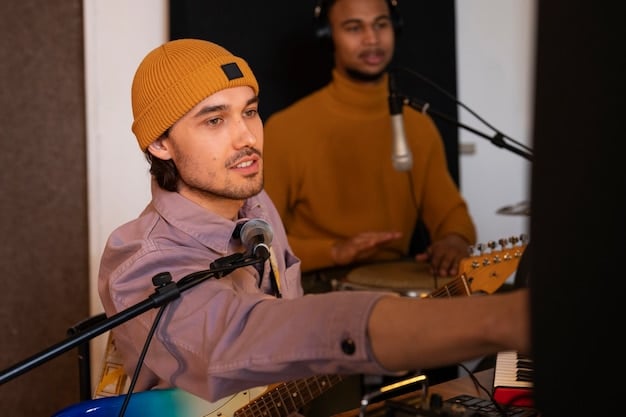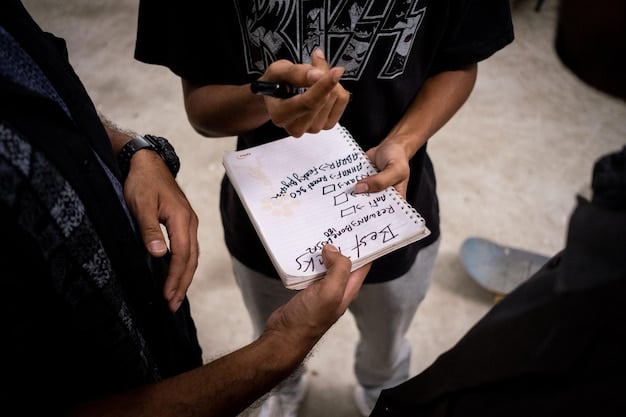Emerging US Rap Artists: Negotiate Better Producer Deals in 2025

Emerging US rap artists seeking better deals with producers in 2025 should focus on understanding contract terms, building a strong brand, networking strategically, and leveraging data analytics to demonstrate their market value.
For emerging US rap artists, navigating the music industry involves more than just talent; it requires savvy business acumen, particularly when it comes to negotiating deals with producers for 2025 and beyond.
Understanding the Music Production Landscape
The music production landscape is constantly evolving, especially for rap artists entering the scene. It’s crucial to understand the key players and dynamics before diving into negotiations.
For emerging US rap artists in 2025, understanding the music production landscape is crucial for negotiating favorable deals. This involves knowing the roles of producers, the types of agreements they offer, and the average costs associated with their services.
The Role of the Producer
Producers are more than just beatmakers; they are collaborators who shape the sound and direction of a track. Their responsibilities can include composing music, arranging instrumentation, mixing and mastering, and even offering creative guidance.
Types of Producer Agreements
Several types of agreements exist, including work-for-hire, royalty splits, and outright purchases. Emerging artists need to understand the implications of each type to ensure they are compensated fairly while retaining ownership of their work.
- Work-for-Hire: The producer creates a beat, and the artist owns it completely. The producer receives a one-time fee.
- Royalty Splits: The producer receives a percentage of the royalties generated by the song. This often continues for the life of the song’s copyright.
- Outright Purchase: The artist buys the beat outright, gaining full ownership and control.
- Co-Publishing: The producer gains ownership of the copyright in the composition of the beat.
Understanding these agreements is crucial for emerging artists to make informed decisions that align with their long-term goals and financial interests.

Building a Strong Brand Before Negotiations
Before approaching producers, emerging rap artists should focus on building a strong brand. A well-defined brand not only attracts fans but also increases negotiating power.
Building a strong brand before negotiating deals with music producers is essential for emerging US rap artists in 2025. A strong brand not only enhances the artist’s marketability but also provides leverage in negotiating favorable terms.
Defining Your Unique Selling Proposition (USP)
What makes you, as an artist, different? Identifying and highlighting your unique qualities helps you stand out in a crowded market. This could be your lyrical style, your message, or your overall persona.
Creating a Consistent Online Presence
Consistency is key. Maintain an active and engaging presence across social media platforms. Use high-quality visuals and content that reflect your brand. Engage with your followers and build a community.
Building a robust online presence helps increase visibility and attract fans. This visibility can directly translate into more favorable deals with producers, who are more likely to invest in an artist with a proven track record of attracting attention.
By establishing a strong brand and online presence, emerging artists create a foundation for successful negotiations and long-term growth in the music industry.
Networking and Building Relationships
Networking is vital in the music industry. Building relationships with producers, managers, and other industry professionals can open doors to opportunities and better deals.
Networking is crucial for emerging US rap artists in 2025 seeking to negotiate better deals with producers. Building strong relationships can lead to more favorable contract terms and long-term collaboration opportunities.
Attending Industry Events
Music conferences, showcases, and networking events provide opportunities to meet producers and other industry professionals. Come prepared with your elevator pitch and be ready to showcase your work.
Leveraging Social Media and Online Platforms
Use social media to connect with producers, share your music, and engage in industry conversations. Platforms like Twitter, Instagram, and SoundCloud are valuable tools for networking.
- Direct Messaging on Social Media: Reach out to producers whose work you admire. Keep your messages concise and professional.
- Collaborating on Online Platforms: Share your music on SoundCloud or Bandcamp and engage with other artists and producers.
- Participating in Online Forums: Join online communities and forums related to music production. Share your insights and connect with like-minded individuals.
Networking is not just about meeting people; it’s about building genuine relationships. Take the time to get to know producers, understand their work, and find common interests to foster long-term collaborations.

Understanding Contract Basics
A thorough understanding of contract basics is crucial for emerging rap artists. Knowing what to look for in a contract ensures you are protected and fairly compensated.
Understanding contract basics is essential for emerging US rap artists aiming to negotiate better deals with producers in 2025. This knowledge empowers artists to protect their rights and secure favorable terms.
Key Contract Terms to Watch Out For
Understanding key contract terms like advance payments, royalty rates, ownership rights, and termination clauses is crucial. These terms determine how you are compensated and what rights you retain over your music.
Seeking Legal Counsel
<
Consulting with an entertainment lawyer is a smart move. A lawyer can review contracts, explain complex legal jargon, and ensure your interests are protected. Legal advice can save you from costly mistakes down the road.
Artists should understand key provisions related to ownership of master recordings, publishing rights, and the duration of the agreement. An attorney review can ensure that these terms are fair and aligned with the artist’s long-term interests.
- Advance Payments: How much will you receive upfront? Is it recoupable from royalties?
- Royalty Rates: What percentage of royalties will you receive from sales, streams, and other sources?
- Ownership Rights: Who owns the master recordings and publishing rights?
- Termination Clauses: Under what conditions can the contract be terminated?
By understanding these basic contract terms, emerging artists can approach negotiations with confidence and make informed decisions that protect their careers.
Leveraging Data Analytics
In 2025, data is king. Emerging rap artists can leverage data analytics to demonstrate their market value and increase their negotiating power when working with producers.
Leveraging data analytics is increasingly important for emerging US rap artists in 2025 as it provides concrete evidence of their market value. Data-driven insights can strengthen their negotiating position with producers.
Tracking Your Streaming Numbers
Monitor your streams on platforms like Spotify, Apple Music, and Tidal. High streaming numbers demonstrate your popularity and potential revenue-generating ability.
Analyzing Social Media Engagement
Keep track of your social media followers, engagement rates, and reach. A strong social media presence indicates a dedicated fan base and marketing potential.
Analyzing streaming and sales data, social media engagement, and audience demographics can help artists understand their strengths and weaknesses.
- Spotify for Artists: Provides detailed insights into your listeners, streams, and geographic reach.
- YouTube Analytics: Tracks views, watch time, and subscriber growth.
- Instagram Insights: Measures follower demographics, engagement rates, and reach.
By leveraging data analytics, emerging artists can showcase their market value and negotiate more favorable terms with producers. Data-driven negotiations are more likely to result in deals that reflect the artist’s true potential.
Alternative Funding and Resources
Exploring alternative funding and resources can help emerging rap artists finance their music production and retain more control over their work.
Exploring alternative funding and resources can empower emerging US rap artists in 2025 to finance their music production and maintain greater control over their creative output and financial arrangements.
Crowdfunding
Platforms like Kickstarter and Patreon allow fans to support your music directly. Crowdfunding can provide the necessary funds for recording and production without giving up ownership.
Grants and Music Organizations
Many organizations offer grants and funding opportunities for emerging artists. Research and apply for grants that align with your music and career goals.
Leveraging these resources can help artists fund their projects without relying solely on traditional music industry structures. Several organizations provide funding and resources specifically aimed at supporting emerging musicians, including seed money and industry guidance.
By exploring these alternative funding options, emerging rap artists can gain more financial independence and negotiate better deals with producers. Financial stability empowers artists to make decisions that are in their best interest.
| Key Aspect | Brief Description |
|---|---|
| 🤝 Networking | Building relationships with producers enhances deal opportunities. |
| 📊 Data Leverage | Using analytics proves market value for better negotiation. |
| 📜 Contract Knowledge | Understanding contract terms is vital for protection. |
| 💰Funding Alternatives | Exploring grants and crowdfunding for financial independence. |
Frequently Asked Questions (FAQ)
Key terms include royalty rates, ownership of master recordings and publishing rights, advance payments, and termination clauses. These terms dictate how you are compensated and what rights you retain.
Use data from Spotify, YouTube, and Instagram to showcase your streaming numbers and engagement rates. This data demonstrates your market value and potential revenue generation to producers.
Common agreements include work-for-hire, royalty splits, outright purchases, and co-publishing. Understanding each type will help you make informed decisions about ownership and compensation.
A strong brand attracts more fans and demonstrates your potential market value. Producers are more likely to invest in an artist with a defined brand and consistent online presence.
Crowdfunding platforms like Kickstarter and Patreon directly support your music, while grants and music organizations offer funding for emerging artists. These options help finance production without sacrificing ownership.
Conclusion
For emerging US rap artists in 2025, understanding the music production landscape, building a strong brand, and leveraging data analytics are crucial for negotiating better deals with producers. By staying informed, seeking legal counsel, and exploring alternative funding options, artists can secure favorable terms and maintain control over their creative output and financial success.





